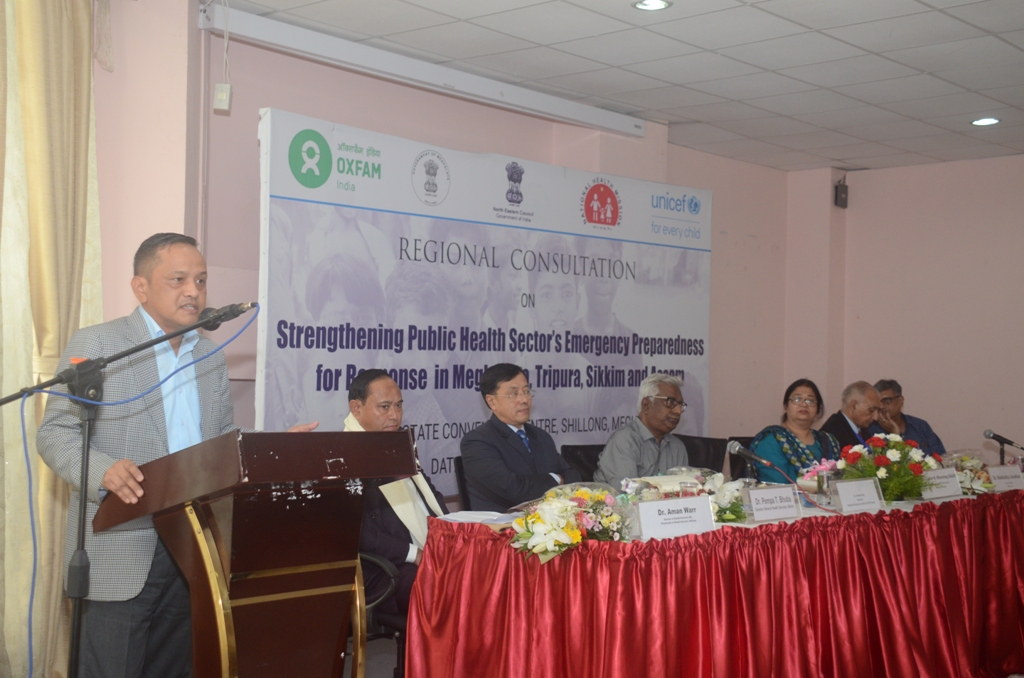Regional Consultation Workshop on Strengthening Public Health Sector held
Regional Consultation Workshop on Strengthening Public Health Sector held

With the aim to understand the current state of preparedness for response in the public health sector and to devise a regional plan for the same, a two days Regional Consultation Workshop on Strengthening Public Health Sector for Emergency Preparedness (EPR) and Response and Disaster Risk Reduction (DRR) for Assam, Meghalaya, Sikkim and Tripura was held today at the State Convention Centre, Shillong. The Workshop was organized by the North Eastern Council in collaboration with the National Health Mission, Government of Meghalaya and supported by UNICEF and OXFAM. Shri. Calvin H Kharshiing, Planning Advisor North Easter Council, Government of India inaugurated the workshop in the presence of senior officers from Health Department of participating states and representatives from UNICEF and OXFAM.
Speaking in the meeting Shri. Calvin H Kharshiing said that we are living in an age where there are multiplicities of natural disaster and the North East is highly vulnerable. He further added that there are unique challenges for the North East in the health sector. As per a study commissioned by NEC and carried out by NEDFi on the state of health care in the North East, some of the challenges identified were shortage of trained manpower, providing access to sparsely populated and remote far flung areas and improvement of governance in the public health sector. Stating that one of the targets under the sustainable development goals is to strengthen the capacities of all countries, especially of developing countries for EPR and DRR of national and global health risk, the NEC which is the regional planning body for the North East has many interventions and initiatives in the area of disaster management, one of which is working closely with NEIGRIHMS and NESAC to use drone technology to deliver essential services. Shri. Kharshiing added that the NEC looked forward to the recommendations of the two days consultations which can be taken forward in NEC’s planning in emergency preparedness of the health sector in the region. He further stressed on the need of evidence which could guide healthcare workers, especially for first time responders to reduce panic and bring in intervention that will help alleviate the situation when a disaster strikes.
Shri. Pankaj Anand, Director Programs and Advocacy, Oxfam India said that globally risk of disaster and emergencies is on the rise. Between 1998 -2017, climate related and geo-physical disaster claimed the lives of over 1.3 million people and rendered another 4.4 billion injured, homeless or in need of emergency assistance. In North East India, each state has a unique concern and challenge and the need of the hour is take stock of our preparedness. In the current state of affair, Shri. Pankaj Anand opined that the North Eastern States are far from equipped to efficiently respond to a massive public health disaster and ensure minimum causality and loss. Therefore, the is a need to work towards greater resilience to meet the challenges and also to works toward formulating specific preparedness action which can be linked to departmental flagship programmes.
Dr. Madhulika Jonathan, Chief of Field Office, UNICEF Assam drew attention to the plight of women and children in emergency situations. She also spoke on the need for minimum preparedness measures which should be in place for rapid response, including measures to strengthen new born health components and minimise the risk of gender based violence. Dr. Jonathan spoke on the need for quality programming and standards which will help align emergency response. The need to engage with communities and planning, monitoring and safe and confidential feedback systems and collaboration with all stakeholders were highlighted upon.

